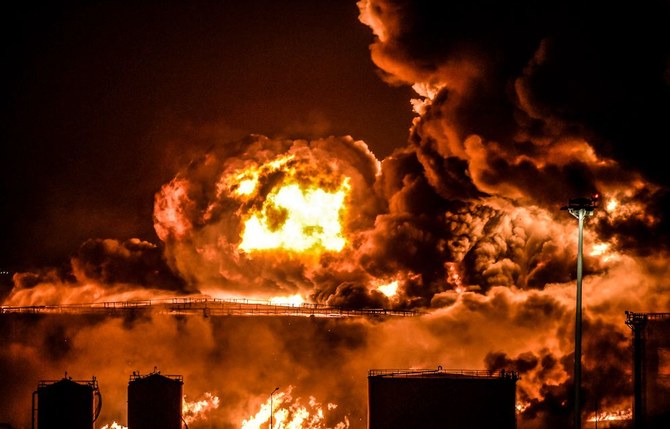
- ARAB NEWS
- 01 Jul 2025

When drones attacked oil production facilities in Abqaiq, eastern Saudi Arabia, on Sept. 14, 2019, Japan was quick to condemn — and actually was the first to call it what it was: A terrorist attack.
I remember this very well, because both Taro Kono, the Japanese defense minister at the time, and I were participating in the annual G1 Global Conference (aka “Davos of Tokyo”) and I took the opportunity to ask the question.
“The most pessimistic scenario right now is that something happens in the Strait of Hormuz and the oil supply gets cut down, and that would send a shockwave through the global economy. I think the price of oil is already rising after this attack on Saudi facilities, so that’s the most worrying scenario right now,” he added.
Kono, of course, is a veteran Japanese politician, a former foreign minister and is currently minister of administrative and regulatory reform. Japan is a net importer of energy, with Saudi Arabia supplying nearly 40 percent of its needs. Naturally, the topic of the Abqaiq attacks dominated the conference and the Japanese headlines for days to come — as one would expect in a country which risked losing nearly half of its energy supply if such a threat persisted.
Fast forward nearly two years and a half to Friday’s drone attacks on the Aramco facilities in my hometown of Jeddah. I couldn’t help but compare Kono’s nuanced, farsighted and accurately worded comments to the weak, bland and nearly pointless statement issued by Anthony Blinken, the current US secretary of state.
The bad news, however, is that US readers and others around the world are the ones who will feel the pinch the most as oil prices are expected to continue to rise.
Faisal J. Abbas | Editor-in-Chief
While on one hand, the chief US diplomat must be applauded for finally describing the Houthi actions as “terrorist attacks,” and for recognizing that Saudi oil production facilities clearly classify as “civilian infrastructure,” there still remains a very simple — albeit Voltairian sounding — question to be answered by his administration.
Who apart from terrorists commit terrorist attacks, Mr. Blinken? So, why in God’s good name, is the US administration still not re-listing the Houthis as a terror organization?
By the way, readers might think that I am beginning to sound like a broken record in my columns by repeatedly calling for holding the Houthis accountable. This is true, and it is true because, like many around the globe, we in this country expect America, as leaders of the free world, to do the right thing and not because we are dependent on American protection — imagine, if we were. Just look at Ukraine!
Those reading these words in the US should know that thanks to our brave troops at the border and our civil defense officers at the fire site, life returned to normal shortly after Friday’s attacks in Jeddah, where a Formula 1 race continued as planned this weekend.
The bad news, however, is that they — US readers and others around the world — are the ones who will feel the pinch the most as oil prices worldwide are expected to continue to rise because of supply concerns. Exactly as former Japanese defense minister Kono warned it would.
The Kingdom cannot — and must not — be left alone to safeguard global energy supplies when the entire world is hurting from price hikes.
Faisal J. Abbas | Editor-in-Chief
A few days ago, Saudi Arabia made an announcement saying that it could not be held responsible for any oil supply issues resulting from Houthi attacks on its facilities. Of course, ever since its first international shipment of oil in 1939, the Kingdom has continued to be a reliable supplier for its clients around the world. Even when the Abqaiq attacks occurred in 2019, we managed to restore our oil production capacity in record time — and earlier than expected.
However, the Kingdom cannot — and must not — be left alone to safeguard global energy supplies at a time when the entire world is unanimously hurting from price hikes which have been further sparked by the uncertainty due to the situation in Ukraine.
As Ukraine continues to battle the Russian army, President Volodymyr Zelensky appeared in a video and addressed Qatar’s Doha Forum on Saturday. Interestingly, he urged an increase in the output of energy. “I ask you to increase the output of energy to ensure that everyone in Russia understands that no one can use energy as a weapon to blackmail the world,” Zelensky told the Doha Forum.
Of course, no matter how much energy output is increased, markets will not be able to rest assured so long as production facilities are targeted and shipments threatened by Iran and its goons.
This is an international issue that impacts almost every household around the globe. Saudi Arabia, therefore, deserves all the support it can get. Maximum pressure — and not maximum appeasement— must be put on the Houthis and their backers in Tehran to ensure that messing about with global energy security, let alone deliberately targeting civilians, does not go unpunished. In layman’s terms: Reducing energy bills will require an increased global involvement. It is as simple as that.